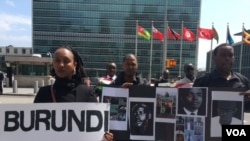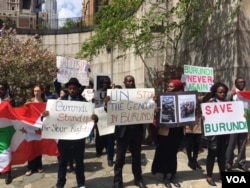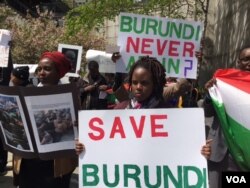Members of the Burundian diaspora and exiled civil society leaders demonstrated Tuesday in front of the United Nations, urging the international community to send a robust U.N. police force to help protect civilians as their country enters a second year of post-election violence.
"We hope that the U.N. won't do the same as what they did back in 1994 in Rwanda," said Sandra Barancira, a Burundian activist who traveled from Ottawa, Canada, for Tuesday's demonstration.
She was referring to one of the U.N.'s greatest failures in not preventing the genocide of Tutsis and moderate Hutus in Rwanda by members of the Hutu-majority government.
"There is a genocide going on today. We need more radical measures from the U.N.," Barancira stressed.
She criticized U.N. recommendations for a force ranging from a few dozen to up to 3,000 police as being woefully insufficient.
"Today, the entire population lives in fear," said prominent Burundian human rights activist Pierre Claver Mbonimpa.
He has witnessed the violence firsthand, surviving an assassination attempt last year that left him seriously injured. Both his son and son-in-law were murdered since the post-election violence began.
Protection of civilians
The bloodshed started last April, when President Pierre Nkurunziza announced he would seek a third term. Many objected, saying it violated the national constitution. The president prevailed and won re-election in July.
Post-election violence has claimed some 700 people. A quarter of a million have fled the country, seeking safety in neighboring countries. The U.N. High Commissioner for Human Rights has warned of a sharp increase in the use of torture, and several mass graves have been reported.
"We are urgently calling for the protection of civilians as Burundi is still on the brink," said Agnes Kiromera Muvira of the Burundi Women and Girls' Movement for Peace and Security during a news conference at the United Nations.
"We would want the U.N. Security Council to urgently send an independent U.N. police force to Burundi to protect the civilians and also to deter both government, but also opposition forces, from committing further human rights violations," she said.
UN recommendations
The U.N. Security Council asked Secretary-General Ban Ki-moon to come up with a plan for a police force for Burundi. Last week, he sent the council his recommendations.
They include three options: a force of 3,000 police who would patrol some of the capital's most troubled areas; a 228-strong deployment with an early warning capacity; or a smaller deployment of 20 to 50 police that would focus on strategic engagement with Burundi's national police.
Ban says in his recommendations that only the first option of 3,000 police "could provide some degree of physical protection to the population against increased threats."
But it is highly unlikely that Nkurunziza's government will accept that option. In a letter from his U.N. ambassador to Ban earlier this month, it was stated that if a large, armed police presence is deployed, it would be "without the agreement of the government of Burundi and its people; it constitutes our red line."
The government prefers only a small contingent of unarmed experts and human rights observers.
Outside the United Nations, the small group of Burundian protesters sang their national anthem and carried signs calling for an end to the violence.
"This can easily turn into a regional war. The U.N. must wake up," activist Barancira warned.








